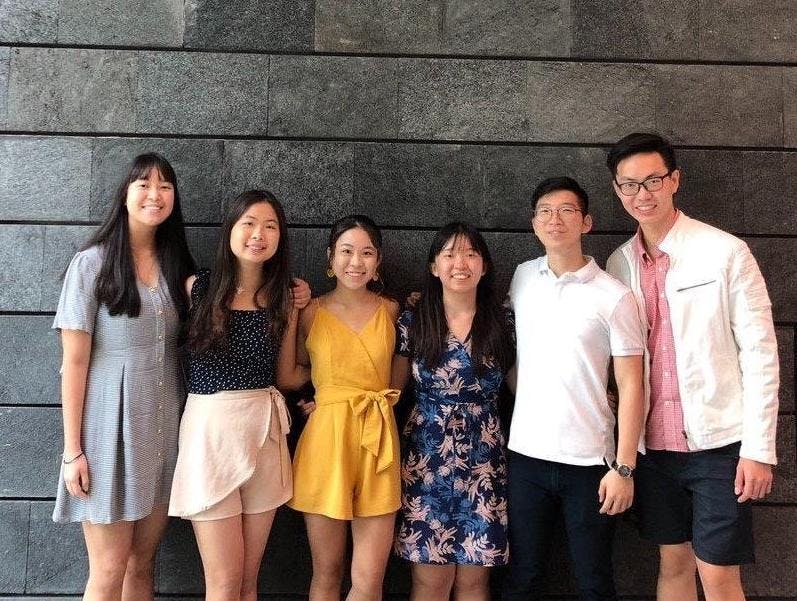While Katrina Lee was volunteering with community service clubs to distribute food rations to low-income households in Singapore, she noticed that something was not quite right.
To continue reading, subscribe to Eco‑Business.
There's something for everyone. We offer a range of subscription plans.
- Access our stories and receive our Insights Weekly newsletter with the free EB Member plan.
- Unlock unlimited access to our content and archive with EB Circle.
- Publish your content with EB Premium.
As she went from door to door, handing out donated food items such as soy sauce, canned soup, and instant noodles, she realised that the recipients didn’t actually want those goods. Most already had these shelf staples in their kitchens, and furthermore, the food items weren’t particularly healthy.
Meanwhile, she was working part-time in the F&B industry, where she saw huge amounts of perfectly edible food being thrown away at the end of each day. At the restaurant where she worked, the management had decided that it was simply more convenient to dispose of fast-expiring produce than it was to resell or donate.
As she puts it in business terms, there was a “mismatch between supply and demand”.
Lee also worked briefly at the Water Agency in Yangon, Myanmar, where she witnessed first-hand how water insecurity and water pollution affected the local community.
Drawing from these experiences, she realised that she wanted to create her own social enterprise to tackle the issues of food wastage and food insecurity in Singapore. Hence, Lee, together with a team composed of students from the National University of Singapore (NUS), where she studies business administration, and Singapore University of Technology and Design (SUTD), decided to launch Savour!, a business-to-business e-procurement and sponsorship platform.
In this interview with Eco-Business, Lee talks about the challenges of starting a sustainable social enterprise and gives advice to other budding sustainable entrepreneurs.
Tell us about your start-up.
Savour! Is a youth-led tech social enterprise that aims to reduce food wastage and tackle food insecurity. We do so through our one-stop business-to-business e-procurement and sponsorship platform, where we aim to connect companies such as retailers and importers. The kind of food that we list on our platform ranges from blemished to surplus food, all of which is edible but often ends up being thrown away.
What have you learned from your time working in sustainability?
Many people say that they believe in ‘sustainability’, but when I was on the ground speaking with merchants and customers, I realised that everybody had different views of what it meant. I found that businesses had very different motivations for incorporating sustainability; some truly valued sustainability itself, while others just thought it would help their profitability and publicity.
It was challenging to convince merchants that sustainability was worth the effort. Many of the merchants we spoke to were SMEs [small-to-medium sized enterprises], who were quite traditionalist. Most hadn’t heard of sustainability, let alone prioritised it. While some merchants were open to the idea of sustainability, they weren’t sure about how to best incorporate it into their businesses, and were uncertain about how it would affect their operations, especially in terms of manpower. We had to convince them of the additional benefits of reducing food waste through our platform, such as recouping costs, clearing inventory, and positive publicity.
What advice do you have for other youths who want to have impact?
Just take the first step! Start with the little things: take up environmentally friendly habits and share with your friends and family about why you think sustainability is important. You can start off by using metal straws and carrying Tupperware instead of relying on single-use plastics.
Coming up with environmental solutions which have a wider impact can begin with something small in your community. For example, while the NUS canteens were under renovation, a group of students led an initiative to provide reusable containers for students to borrow instead of opting for takeaways in disposable packaging. So, the idea doesn’t have to be very grand, but can start from observing the little things around you.

The team at Savour!, comprising of students from NUS and SUTD. Image: Katrina Lee
Another way to come up with sustainability solutions is by participating in competitions and hackathons. There are many out there for students, and they can provide support and resources to help kickstart your idea. That’s actually how Savour! came about— we participated in many sustainability competitions and won one of them, which provided us with the funding needed to make our idea a reality.
Finally, it’s important to find team members and mentors to help carry your ideas through. I was able to meet other students who are passionate about environmental sustainability through participating in university clubs and societies.
Which companies do you admire for their approach to sustainability?
I admire Patagonia because they’re one of the rare fashion businesses that are completely transparent about the way they source and produce their clothes. Usually, the fashion industry is murky about the origins of their products, how workers are treated, and whether the materials used were ethically sourced.
I like that Patagonia does things very differently—they have a clear breakdown on their website of the environmental and social impact of manufacturing their clothes, from the workers’ labour, to the sourcing of raw materials, to transportation. They’ve built up a solid reputation because they stand true to their values.
What’s next for Savour!?
We’re hosting our official platform launch event on 15 August, which will allow companies, non-profit organisations, and merchants to sign up for an account to use our platform. We’ll be sharing a special video featuring the stories of our merchant partners who are listing their expiring, blemished, and surplus food on our platform to reduce their food waste. We’ll also be conducting two zero waste workshops, showing how mango seeds can be converted into flour, and another on composting.





















